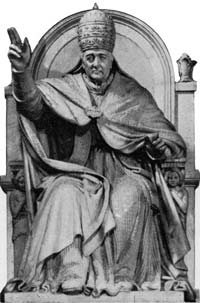Bartolomeo Alberto Cappellari was born in Belluno in the Veneto on September 18, 1765. At 18 years of age, he joined the Camaldolese Hermits and took the name Dom Mauro. He held the office of abbot, procurator general and vicar general of his order before being created cardinal on March 13, 1826 and subsequently was appointed prefect of the Congregation of Propaganda Fide. On February 2, 1831 after a fifteen day conclave, he was elected pope and took the name of Gregory XVI. He vigorously promoted the Catholic missions. In the Papal States, he struggled to maintain his temporal authority. He made important administrative, judicial, financial and economic reforms. He died on June 1, 1846.

Bishop de Mazenod mentions Gregory XVI about 150 times in his letters and in his diary. He wrote him at least twenty letters and five times was received in private audience with him, four times in 1832 and 1833 with regard to the Icosia affair (See article: Icosia) and on July 16 in 1845 on the occasion of his trip to Rome to bless the marriage of his niece Caesaria de Boisgelin with the Marquis Charles de Damas.
Father de Mazenod was in Rome in 1826 when Dom Mauro was appointed cardinal and, on March 16, assisted at the public consistory in which pope Leo XII bestowed the cardinal’s hat on Father Micara, the Father General of the Capuchins and on Dom Mauro Cappellari, the Camaldolese abbot.
From Billens in Switzerland where he was taking some rest in September of 1831, on behalf of the Oblates, Father de Mazenod congratulated the pope upon his election and asked him to confirm the approbation of the Congregation bestowed by Leo XII and Pius VIII. The Pope responded on December 10, 1831 by a rescript conserved in the Oblate General archives. Also in the archives, we have conserved the original of two other rescripts from Gregory XVI in which he thanked Bishop de Mazenod for the details he provided concerning the death of Cardinal Latil who died at Gémenos near Marseilles on December 1, 1839. In the other rescript, dated August 2, 1845, the Pope thanked the bishop of Marseilles for his letter of July 8 in defence of religious congregations and the Jesuits.
The letters of Bishop de Mazenod to Gregory XVI deal with several questions: the Icosia affair of 1832-1833, formal complaints lodged against priests guilty of bad conduct (Jonjon, Jonquier in 1835-1836, Rosatini in 1844), petitions in favour of divine office prayers specific to the Oblates in 1832 and for obtaining the scapular of the Immaculate Conception in 1837-1838, the definition of the Immaculate Conception in 1842, the approbation of the canons of the General Chapters at the beginning of 1846), etc.
Several times, Bishop de Mazenod stated that the Pope recalled him to Rome in 1833 to protect him from the attacks and the threats levelled at him by the political authorities in Marseilles and Paris. At the time, he suggested that he remain in Rome and offered to “throw open to him the field of careers in the pontifical service.” (Pastoral letter of June 9, 1846 and letter to Bishop Baillès, Bishop of Luçon, January 30, 1856). In the month of May, 1838, Bishop Guibert, bishop of Viviers, was received in audience by the Pope who “spoke at great length about the zeal of the Bishop of Marseilles; [His Holiness] did nothing to hide the esteem in which he held him.” (Mazenod Diary, May 18, 1838)
On the occasion of Gregory XVI’s death, Bishop de Mazenod wrote in the June 5, 1846 entry of his diary: “Terrible news of the unexpected death of Pope Gregory XVI. A letter from Bishop d’Isoard who told me the news in these terms: “After a few days of illness that was a cause of concern much more because of its duration rather than for its seriousness, this morning (June 1) at nine o’clock in the morning our Holy Father the Pope rendered his soul to God. You know how much affection this eminent pontiff had for me. Consequently, I am very upset about it, but I am much more concerned about the grave circumstances surrounding this momentous event. Never have spirits been worse disposed. This evening an dispatch-rider brought news that a conspiracy was discovered in Ancona. But, as God wills it. I place all my confidence in him and I firmly believe that he will draw forth from the unknown the man who will respond to these circumstances. What a great pontificate a great man could build with God’s help! No doubt, but how do we go about finding such a man? God will raise him up if he does not already exist.”
Yvon Beaudoin, o.m.i.
